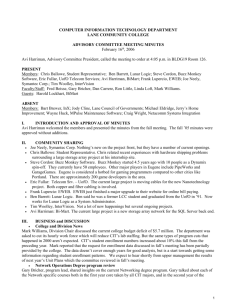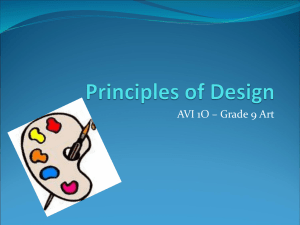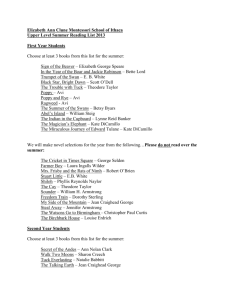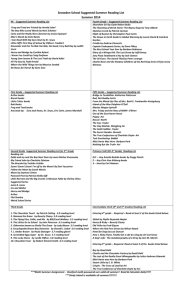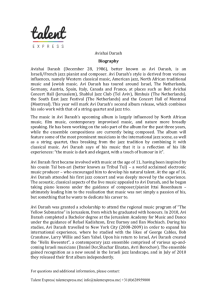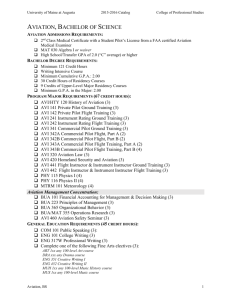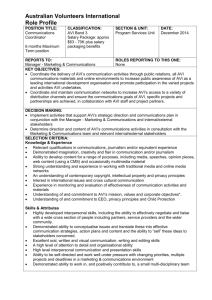May 19th @ Bi-Mart - Lane Community College
advertisement
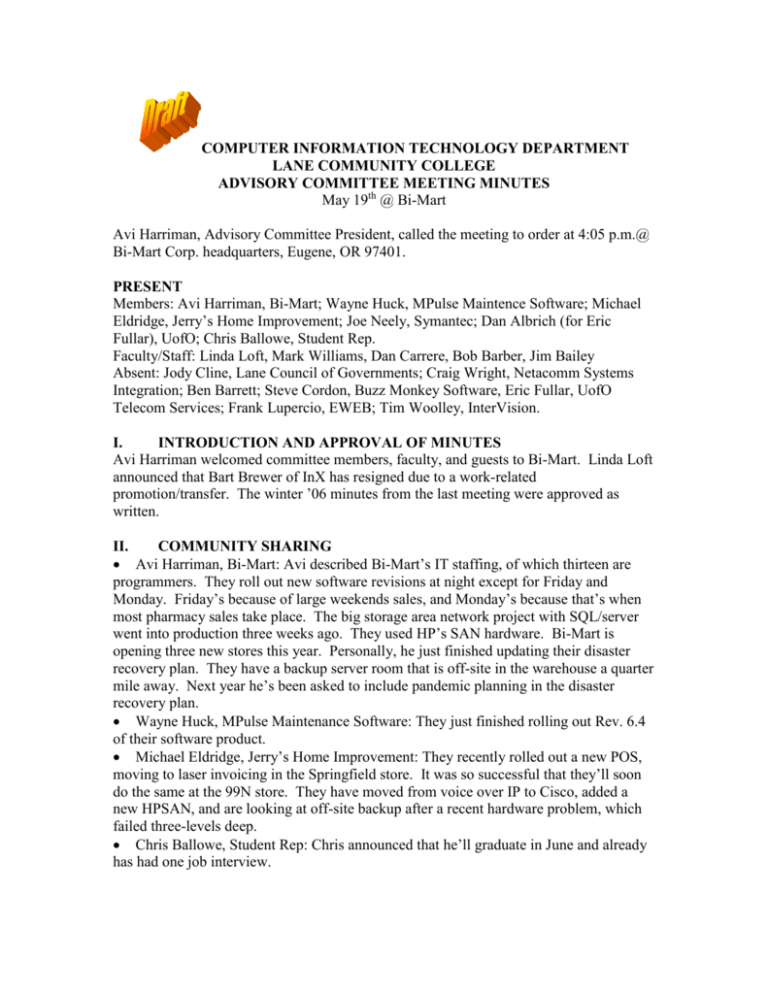
COMPUTER INFORMATION TECHNOLOGY DEPARTMENT LANE COMMUNITY COLLEGE ADVISORY COMMITTEE MEETING MINUTES May 19th @ Bi-Mart Avi Harriman, Advisory Committee President, called the meeting to order at 4:05 p.m.@ Bi-Mart Corp. headquarters, Eugene, OR 97401. PRESENT Members: Avi Harriman, Bi-Mart; Wayne Huck, MPulse Maintence Software; Michael Eldridge, Jerry’s Home Improvement; Joe Neely, Symantec; Dan Albrich (for Eric Fullar), UofO; Chris Ballowe, Student Rep. Faculty/Staff: Linda Loft, Mark Williams, Dan Carrere, Bob Barber, Jim Bailey Absent: Jody Cline, Lane Council of Governments; Craig Wright, Netacomm Systems Integration; Ben Barrett; Steve Cordon, Buzz Monkey Software, Eric Fullar, UofO Telecom Services; Frank Lupercio, EWEB; Tim Woolley, InterVision. I. INTRODUCTION AND APPROVAL OF MINUTES Avi Harriman welcomed committee members, faculty, and guests to Bi-Mart. Linda Loft announced that Bart Brewer of InX has resigned due to a work-related promotion/transfer. The winter ’06 minutes from the last meeting were approved as written. II. COMMUNITY SHARING Avi Harriman, Bi-Mart: Avi described Bi-Mart’s IT staffing, of which thirteen are programmers. They roll out new software revisions at night except for Friday and Monday. Friday’s because of large weekends sales, and Monday’s because that’s when most pharmacy sales take place. The big storage area network project with SQL/server went into production three weeks ago. They used HP’s SAN hardware. Bi-Mart is opening three new stores this year. Personally, he just finished updating their disaster recovery plan. They have a backup server room that is off-site in the warehouse a quarter mile away. Next year he’s been asked to include pandemic planning in the disaster recovery plan. Wayne Huck, MPulse Maintenance Software: They just finished rolling out Rev. 6.4 of their software product. Michael Eldridge, Jerry’s Home Improvement: They recently rolled out a new POS, moving to laser invoicing in the Springfield store. It was so successful that they’ll soon do the same at the 99N store. They have moved from voice over IP to Cisco, added a new HPSAN, and are looking at off-site backup after a recent hardware problem, which failed three-levels deep. Chris Ballowe, Student Rep: Chris announced that he’ll graduate in June and already has had one job interview. Joe Neeley, Symantec: Symantec’s big project is a new building which will be completed in July. They’ll be able to double their size to 2,000 employees with the new facilities. Dan Albrich, Help Desk Services Manager, UofO Computer Services: Dan sat in for Eric Fullar who was unable to make it. The news of the day was funding was granted for a joint project they have with the library. The project is called “Learning Commons”. III. BUSINESS and DISCUSSION College and Division News Mark Williams reported that the LCC Board has approved budget cuts in Administration and Instruction Support areas for next year. The college is still facing another $5-6 million cuts the following year. All areas will be affected including instruction. Chris Ballowe commented that the lab room was fuller with the reduced lab hours because of cuts in CIT’s lab staffing. He had heard of one student buying their own router equipment to complete assignments at home because they couldn’t find time to do their work in the lab now. Mark announced that the department was given funds to develop mini-certificate programs in Network Security and Gaming. And that CIT was one of three participants on a GIS grant application that had just been awarded $800K from the National Science Foundation over the next three years. Computer User Support Program Review: Bob Barber presented the CUS program, describing the major courses in the 2nd year of the program. These include: 1) courses in troubleshooting both software and hardware, 2)a course emphasizing the ‘soft’ skills and communication aspects of support, and 3).a capstone course which including ticketing systems. They are looking at new directions for the program and asked whether less emphasis on application and more on networking would be appropriate. Bob also talked about the need to do a survey of local employers about the mix of skills desired for user support. He asked advisory members for help in writing questions for the survey, and corporate donations to offset the mailing costs of approximately $2k. Avi Harriman responded that at Bi-Mart all employees need to come in having the basic computer skills which includes word processing and spreadsheets. Unlike ten to fifteen years ago, IT no longer is expected to train employees with these basic skills. Now user support technicians are involved on the hardware side: setting up machines, etc. or as help desk personnel. However, help desk employees act only as a dispatch service, entering items into a tracking system, or giving quick, short, non-technical answers. People must know how to ‘ticket’ problems and how to escalate problems. They need a whole class in Internet searching so that they can find the right answers to problems. The best thing to teach user support people is 1)how to interface with the end users, 2)how to determine users technical needs, and 3)be able to communicate that information to the manager. Instead of a mailed survey, Avi suggested doing in-depth interview surveys of about 20 companies. As per a mailed survey, don’t put stamps on the return envelope, because people will just use their company’s postage stamp system. Joe Neeley said that at Symantec, help desk personnel were basically there to reset passwords. They have no resources to do basic applications training. They do however, have a whole training department that trains on their product lines as well as the underlying operating systems for the applications. As per CUS personnel in small firms, from his previous experience as a reseller, small shops don’t have any IT-knowable personnel. When they have a problem, they call an outside service. For firms a little larger, with perhaps a support person or two, the emphasis is on standardizing the desktop, ghosting and setting up new machines, computer repair, fixing drives, remote access, antivirus, purchasing, and research. He recommended surveying the reseller and outsource/consulting businesses to determine the needs of the small business firms. Michael Eldridge from Jerry’s Home Improvement said they haven’t answered an excel question in months. User support technicians answer hardware questions. Computer user support personnel have migrated from being experts in application technologies to working as a team and managing outsourced experts. We don’t want people spending time putting things into Excel and Access. The end users should not be making their own data repositories because they are always out-of-sequence with the real data. It’s a minefield of bad data. They promote having one ‘version of the truth’ rather than minisets of data by end-users. Dan Albrich said at the UofO it’s knowing how to communicate, where to find answers, and how to problem-solve that is important. Support personnel need to know how to give students and staff purchasing advice and tell them how to set up their computers. In determining answers, they need to analyze large amounts of vendor/purchasing information, to find the right answers. A huge amount of time goes into researching products for purchasing. It doesn’t matter whether they are computers, or hand-held devices – PDA’s, calendaring, etc. , plus they need to know how each of them interfaces with the other. They answer applications questions about once every 6 months. Most support questions are about management of the operating system, removing spyware, cleaning and backing up their drives, etc. Lunch Meetings: Avi Harriman reported for the April meeting saying that it was fun, personally relevant, and good networking. Chris Ballowe reported that there were only three folks at the May meeting. It was decided to talk about its feasibility again in the fall. Reinventing Instruction; Mark Williams explained the administration’s push towards finding a solution to improve instruction with less resources, given the budget situation. He asked what ideas members might have. Avi Harriman said that for professional advancement, Bi-Mart would be looking for seminars in VB, SQL/Server, .NET, Unix, and CISCO. He suggested that LCC become a center for certified training workshops. Evening courses 6-8 weeks in length would be good. When asked about online learning, he said that demonstrated seat time was necessary for his company’s HR department. Michael Eldridge replied that the best classes he ever had were methodology and logic courses. They were courses which taught him how to think and problem solve. Dan Albrich said that they were more interested in people that are aware of the processes they follow and can reiterate the process through which they reach a conclusion. People need to be able to demonstrate what they learned. But he thinks that one might charge "real money" even for a short duration intensive workshop (provided the content is good). A broader group of folks might really enjoy intensive 1-2 day workshops on computing topics including those taken from the academic curriculum but not for credit. The issue for the target audience is not so much limited money, but limited time. If the intensive workshop were taken from the existing curriculum someone might take the workshop first to see if they want to pursue deeper investigation, ie traditional class, on that topic. Joe Neely responded that traditional educational degrees shouldn’t be abandoned. The approaches need to be several. He suggested summer concentrated certificates, and professional development short courses. Professional Certification: Joe Neely said that certificates show that people can learn. He respects it as an add-on on a resume. Dan Albrich replied that people with certificates don’t necessarily prove to be knowledgeable. Michael Eldridge echoed that sentiment. Avi Harriman said that there’s a problem that certified people are test takers with good short term memory, but without great technical depth. Online courses: Chris Ballowe said that he had taken a couple online courses and would recommend them. Joe Neely suggested recording classes and putting them on the web. Avi Harriman mentioned video conferencing and that most IT people have high band-width at home. Michael Eldridge said that his experience with web-based meetings (without video) was really great. Next Year’s Meetings: It was decided to have the Fall meeting at LaneCC, and Michael Eldridge volunteered to host the Winter meeting at Jerry’s Home Improvement. Avi Harriman suggested that we have more student involvement in the committee. It was also recommended that we have more people from smaller shops. Joe Neely suggested that it would be even better to have Resellers represented because they are the folks that deal daily with the small shops. The small shops themselves don’t have IT. INX(InfoGroup NW), Computer Systems West, and Pacific Cascade IT were recommended as Resellers to investigate. Linda Loft will email Michael Eldridge and Avi Harriman for more recommendations. Presentations: Linda Loft presented Chris Ballowe and Avi Harriman with Certificates of Appreciation for their service on the CIT Advisory Committee. The meeting was adjourned at 6pm. Avi Harriman then led the group on a tour of BiMart’s computer facilities. Respectfully Submitted, Linda Loft, Committee Coordinator Copies: Advisory Committee Members, Mark Williams, Interim Division Chair, Computer Information Technology Patrick Lanning, AVP for Instruction, OISS
